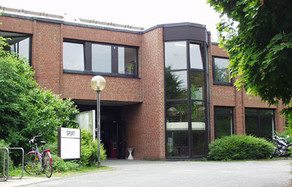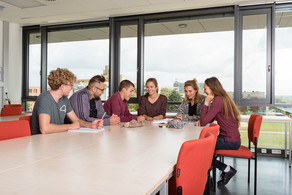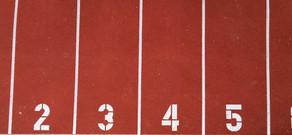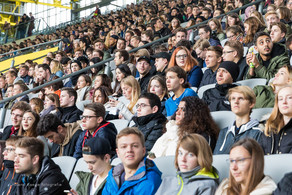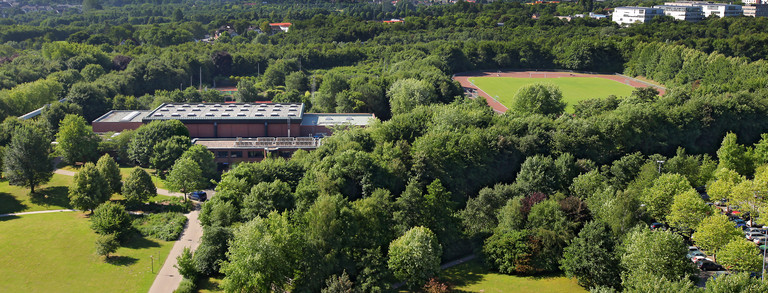Prof. Dr. Miriam Seyda

Head of Department 3: Sport Didactics
Room 1.119
Otto-Hahn-Strasse 3
44227 Dortmund, Germany
Phone: +49 231 755 4108
Fax: +49 231 755 4105
E-mail
Office hours:
There will be no office hours on February 3.
Office hours during the lecture-free period (please register by email):
Wednesday, February 11, 1:00 p.m. – 2:00 p.m.
Tuesday, February 17, 9:00 a.m. – 10:00 a.m.
Wednesday, March 18, 10:00 a.m. – 11:00 a.m.
Thursday, April 9, 11:00 a.m. – 12:00 p.m.
Office hours during the 2026 summer semester (April 13 – July 24):
Tuesday, 1:00 p.m. – 2:00 p.m. (no appointment necessary)
Office hours will take place in person.
About the person
- Managing Director of the Institute
- Head of AB 3: Sport Didactics
- Member of the Senate of TU Dortmund University
- Member of the Standing Committee of the DoKoLL
- Member of the AG TP-Modul
- Member of the FKR of Faculty 16
- Chairwoman of the examination board for the teaching profession of Faculty 16
- Deputy member of the Ethics Committee
- Module coordinator for module G/II.C & K/II.F
1997 - 2004: Study of German Language and Literature, Sport Science and Psychology at the Carl von Ossietzky University Oldenburg, Germany
2004: Graduation: Magistra Artium (Sport Science, German Studies)
2004 - 2006: Research assistant in the project ''Bewegte Sportwissenschaft''. Assistant in the project ''Bewegte Pause'' of the Central Institution for University Sports of the Carl von Ossietzky University Oldenburg
2004 - 2009: Research assistant at the Department of Sports and Sport Science at the TU Dortmund University (Third-party funded project: "Daily Sports Lesson at Elementary Schools in NRW")
2009 - 2013: Research assistant at the Department of Sports and Sport Science at the TU Dortmund University
2010: Doctorate (Dr. phil.) with the topic: Personality development through movement, play and sport. The importance of school sports for self-concept development in primary school age
2013 - 2018: Junior professor and head of the Department of Movement, Play and Sport in Childhood, Institute of Sport Science, WWU Münster.
2016: pos. interim evaluation
2017-2018: Substitute professor and head of the Department of Sport Pedagogy and Didactics, Department of Sport Science, European University Flensburg
2018-2022: University professor and head of the Department of Sport Pedagogy and Didactics, Department of Sport Science, European University Flensburg
since 03/2022: University professor and head of the Department Sport Didactics
Hinternesch, S., Schwier, J., & Seyda, M. (2021). Digitalisierung meets Internationalisierung. Blended-Learning im Praxissemester. Zeitschrift für Studium und Lehre in der Sportwissenschaft, 4(1), 19-25.
Seyda, M., Egerer, M., Langer, A., & Hendricks, P. (2021). Gesundheitsförderung durch sportliche Angebote im Ganztag der Grundschule -- Ergebnisse eines dreijährigen Projekts. motorik, 44(3). 1-14.
Seyda, M. (2020). Sportlehrer*innenkompetenzen und Lehrer*innenprofessionalität. In E. Balz, C. Krieger, W. Miethling, & P. Wolters (Hrsg.), Empirie des Schulsports – Neuauflage (S. 218-243). Meyer & Meyer.
Seyda, M., Egerer, M., Hendricks, P., & Langer, A. (2020). „Kindergarten in Bewegung“ – Ein Projekt zur Steigerung von Bewegungs-, Spiel- und Sportmöglichkeiten im frühen Kindesalter. In J. Erhorn, J. Schwier, & B. Brandes (Hrsg.), Bewegung – Spielraum für Bildung (S. 181 – 196). transcript.
Thiele, J., & Seyda, M. (2020). Die Idee einer „Tägliche Sportstunde“ an Grundschulen. In E. Balz, & P. Neumann (Hrsg.), Grundschulsport: empirische Einblicke und pädagogische Empfehlungen (S. 323-334). Meyer & Meyer.
Seyda, M., & Langer, A. (2020). Die Orchestrierung des diagnostischen und didaktischen Handelns im Sportunterricht. Eine Frage der Kompetenz. sportunterricht, 69(8), 353-357
Seyda, M. (2018). Ausgeglichen und entspannt dank Sport? Schüler. Wissen für Lehrer. 18, 30-31.
Seyda, M. (2018). Können Sportlehrkräfte die Perspektive ihrer Schülerinnen und Schüler einnehmen? Eine Untersuchung über die Akkuratheit von Beurteilungen physischer Fähigkeitsselbstwahrnehmungen. Unterrichtswissenschaft, 46(2), 215-232.
Gebhard, B., & Seyda, M. (2017). Chronische Erkrankungen und Sportunterricht. In M. Giese & L. Weigelt (Hrsg.), Inklusiver Sport- und Bewegungsunterricht. Theorie und Praxis aus der Perspektive der Förderschwerpunkte (S. 279-314). Meyer & Meyer.
Burrmann, U., Seyda M., Konowalczyk, S., & Heim, R. (2016). Individualisierungstendenzen im Sport von Heranwachsenden - revisited. Sport und Gesellschaft, 13(2), 113-143
Heim, R., Konowalczyk, S., Grgic, M., Seyda, M., Burrmann, U., & Rauschenbach, T. (2016). Geht´s auch mit der Maus? Eine Methodenstudie zur Online-Befragung in der Jugendforschung. Zeitschrift für Erziehungswissenschaft, 19(4), 783-805. [IF : 0.485]
Seyda, M., & Thiele, J. (2016). Nachhaltigkeit in der Schulsportentwicklung? Eine exemplarische Analyse. Zeitschrift für Sportpädagogische Forschung, 1, 5-20.
Seyda, M. (2016). Potenziale einer Selbstkonzeptförderung von Heranwachsenden in und durch Schulsport. Bewegung & Sport, 70(1), 28-31.
Seyda, M. & Meier, H.E. (2015). Relations between social inequalities and effects of increased supply of physical education on children´s health – a longitudinal study on elementary schools. Journal of Physical Education and Health, 6, 5-14.
Seyda, M. (2015). Editorial. motorik, 38(1). 1-2.
Seyda. M. (2013). Ziele einer Selbstkonzeptförderung von Kindern durch Bewegung. motorik, 36(2), 72-79.
Seyda, M. (2013). Wirkungen einer „Täglichen Sportstunde“ auf die Entwicklung von Grundschulkindern. Bewegung & Sport, 67(1), 21 - 26.



